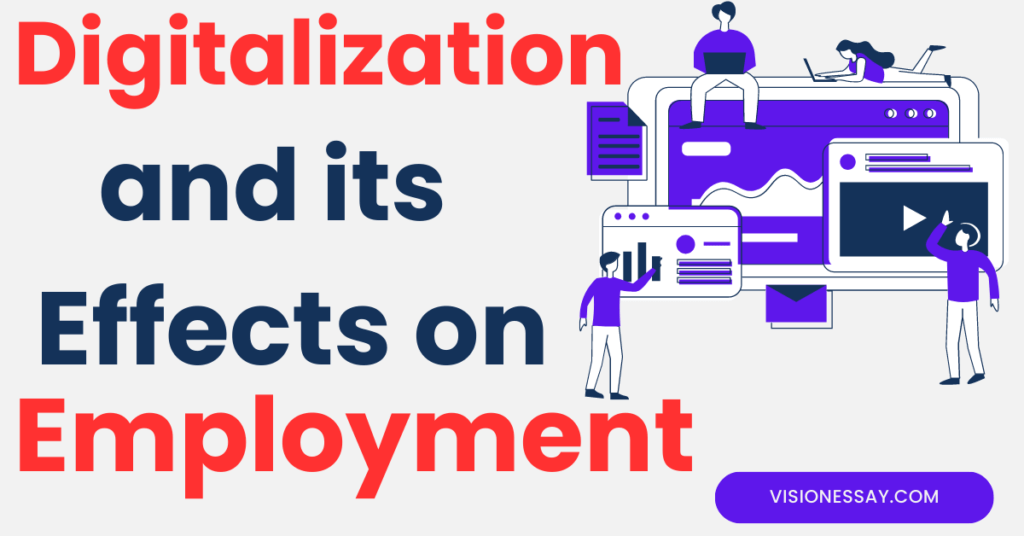Digitalization and its Effects on Employment in 2023

What is Digitalization?
Digitalization is the process of transferring information, data, processes, and activities from analog to digital formats. This is frequently done to make better use of digital technology and increase productivity, accessibility, and effectiveness. It entails integrating digital tools, technology, and tactics into a variety of corporate, societal, and everyday contexts. Communication, data processing and storage, automation, and other fields are all included in the broad concept of digitalization. A dramatic shift has taken place toward using digital technology to change established systems and procedures.
How Does Digitalization Impact Employment?
Employment is significantly impacted by digitalization, which is the adoption and integration of digital technology into many spheres of society and the economy, in several ways.
Positive Impact on Employment
- New Job Opportunities: As a result of digitization, new tech-related jobs are created, including those for data analysts, cybersecurity professionals, digital marketers, software developers, and others.
- Increased Efficiency: Automation and digital technologies can simplify routine activities so workers can concentrate on more imaginative, complicated, and strategic work, which will increase their job satisfaction and skill development.
- Flexible Work Arrangements: With the advent of digitalization, employees now have more control over their schedules and a better sense of work-life balance thanks to remote work and flexible work options.
- Global Collaboration: Digital technologies make it possible to collaborate beyond regional borders, giving businesses access to global talent and enabling the formation of diverse, global teams.
Negative Impact on Employment
- Job Displacement: Certain employment, particularly those involving mundane work, may be replaced as a result of automation and the use of digital technologies. For instance, software and robots may take the place of workers in the manufacturing industry.
- Skill Gap: A staff with modern digital capabilities is necessary to support the digital transition. Those without these abilities can have trouble finding work or experience wage pressure.
- Digital Divide: Not everybody has access to technology or the knowledge required to succeed in a digital workplace. This may make employment market disparities worse.
- Privacy and Security Concerns: There may be an increase in demand for cybersecurity and data privacy specialists as a result of growing digitalization.
Also Read: Work From Home: Opportunities and Challenges
What are the Benefits of Digitalization?
- Improved Efficiency: By streamlining and automating processes, digital technologies can cut down on manual work and the possibility of human mistakes. As a result, production and efficiency both rise.
- Cost Reduction: Businesses may save expenses in areas like personnel, paper, storage, and physical infrastructure by automating repetitive procedures and improving operations.
- Enhanced Customer Experience: Data analysis, AI-driven suggestions, and effective communication channels provide individualized client experiences as a result of digitization. Increased client loyalty and satisfaction may result from this.
- Global Reach: Businesses may reach a worldwide audience and increase their consumer base by utilizing digital platforms and e-commerce.
- Data Analysis: Businesses can gather and analyze vast volumes of data thanks to digital tools. Making educated judgments, seeing trends, and refining tactics are all made possible by this data.
What are the Challenges of Digitalization?
- Job Insecurity: In a fast-evolving digital environment, employees may experience increasing job insecurity as they worry that their positions may one day be automated or that their abilities may become outdated.
- Mental Health Impacts: Employee stress and burnout may be exacerbated by employees’ dependency on digital gadgets and continual communication. Work and personal life can become entangled in the “always-on” lifestyle.
- Algorithmic Bias: Algorithms are frequently used in automated employment and decision-making processes, which might reinforce past data biases. Discrimination in recruiting and promotion choices may come from this.
- Economic Disparity: Although digitalization can lead to the creation of well-paying employment in technology and allied industries, it can also worsen economic inequality since those who possess the appropriate skills gain more than others.
- Loss of Human Touch: The rising use of automation and chatbots in customer service and other positions may result in a loss of the human touch, which might affect the standard of service and consumer happiness.
How Does Digitalization Relate to Employment?
- The employment environment, job responsibilities, and skill needs are all dramatically impacted by digitalization.
- Particularly in tech-related areas, automation, artificial intelligence, and technology-driven efficiency can eliminate some employment while generating others.
- Digital literacy and flexible abilities are becoming crucial for both the existing workforce and job seekers.
- Remote employment, flexible work schedules, shifting work patterns, and regional job dispersion are all made possible by digitalization.
- The potential for development offered by digitization helps the whole economy, making data-driven decision-making and cybersecurity positions more significant.
Conclusion
Digitalization and employment have a complex and changing relationship. For the workforce, digitalization presents both benefits and problems. It can spur economic growth through improved job quality, the creation of new employment, and higher productivity. However, it also results in job displacement, adjustments to the skill set needed, and worries about job security.
Frequently Asked Questions(FAQs)
What is Digitalization, and how does it impact employment?
Digitalization refers to the integration of digital technologies into various aspects of business and society. It impacts employment by changing job roles, skill requirements, and the availability of jobs.
What are Benefits of Digitalization for employment?
Digitalization can create new job opportunities, improve job quality, and enhance workforce productivity by automating tasks and processes.
How does Digitalization affect job displacement?
Digitalization can lead to job displacement when automation and AI replace routine or manual tasks. However, it can also create new roles in tech-related fields.
How does Digitalization contribute to economic growth?
Digitalization drives economic growth by increasing efficiency, reducing costs, and fostering innovation in various industries, leading to job creation and expanded markets.
Sources:
- https://indianexpress.com/article/business/economy/automation-digitisation-to-affect-careersimpact-job-security-2932756/
- https://www.thehindu.com/podcast/how-will-the-rise-of-ai-impact-jobs-in-focus-podcast/article66386538.ece
Leave a Reply